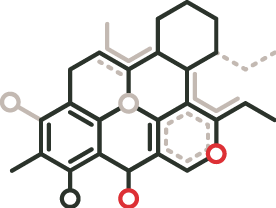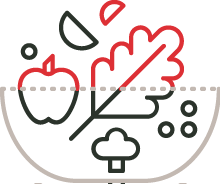
Key research expertise in:

cardiometabolic diseases

pharmacochemistry

neurodegenerative diseases

Cancer

food and nutrition
The Centre for Clinical Research (CRC), approved by the Catholic Institute of Lille, focuses on clinical investigation based on four approaches: Mother-child, Onco-haematology, Chronic diseases in adults and ageing, and Disability and individual support, research into a transdisciplinary approach and care.
Established in 2008, the Clinical Investigation Centre for Innovative Technology (CIC-IT) is a functional unit of the Regional and University Hospital Centre of Lille which studies biosensors and e-health from the perspective of innovation and uses. Its teams, which include computer engineers, signal processing engineers, ergonomists, and clinicians, supervise clinical research projects to develop innovative technologies and facilitate the creation of new companies.
Charles Viollette Institute is an agro-food and biotechnology regional research centre. It aims to find, identify, characterise, and enhance molecules of interest from natural pathways (plants, micro-organisms, milk). This work focused on acquisition and industrial production processes, applied in the
health and nutrition sectors, aims to achieve sustainable management of resources.
The DISTALZ Labex (centre of excellence) brings together seven of the best international research units in the field of Alzheimer’s disease, five of them are located in Lille (the Institut Pasteur de Lille, the Lille Regional and University Hospital Centre (CHRU), the National Institute of Health and Medical
research (Inserm), the French National Centre for Scientific Research (CNRS) and Lille University.
DISTALZ aims to study the biological processes involved in Alzheimer’s disease, especially in light of recent discoveries in genomics, and also to develop new biomarkers for the disease and biological targets.
The leading French research institute devoted to diabetes (types 1 and 2), obesity, and associated risk factors. EGID is the only centre worldwide to have such a broad range of activities in its field: fundamental research, academic and professional training, prevention, prediction, clinical applications, industrial development and promotion of public healthcare projects.
The Institute Faire Faces was founded in 2009 by Professor Devauchelle, following the first face transplant he and his team performed in 2005. The Institute is a one-of-a-kind reference centre in Europe, dedicated to Research and Training in the field of head and neck surgery (face, neck, cortex, upper aerodigestive tract).
The Institute’s activities can be grouped into 3 main areas: Research, Training and Information.
When it comes to research, the transdisciplinary team made up of 55 researchers and clinicians develop exploratory and fundamental research programs in anatomy, imaging, biochemistry, histology in order to develop innovative therapies (oncology, psychology, cellular engineering), especially in the field of surgery (robotics, precision surgery, simulation).
In terms of Information, the Institute strives to become the go-to place and resource for information on disfigurement, with the goal of educating people for a better social integration of those who suffer from a facial handicap.
The in-person or virtual training programs offered to medical professionals allow the Institute to share knowledge as well as advanced head-and-neck surgical techniques and approaches. When the Institute moves into its new 350 square-feet facility in 2021, it will boast an 8-table experimental operating room, with courses offered on live tissue or anatomical specimens.
The training facilities, as well as the Institute’s cutting-edge imaging platforms (3 Tesla MRI and a 3D facial movement capture platform) are available to third-parties who wish to use them for their own research or training needs.
The Institute, its mission and innovative programs, are supported by a wide network of academic, institutional and industrial partners (CHU, Région Hauts de France, Amiens métrople, FEDER, France National Research Agency, University of Picardie Jules Vernes, CEA – public research institution, Technology Univeristy of Compiègne, Brothier, Philips, Gueules Cassées…).
Established in Lille in 1894, the Institut Pasteur is a private foundation recognised for its work of public interest. The institute works with various research teams (mainly focused on infectious, inflammatory, and parasitic diseases; cancers; and cardiovascular, metabolic and neurodegenerative diseases) and aims to harness science to serve public health. In order to achieve this goal, the institute benefits from latest technological resources, especially from the Biological institute of Lille (IBL), which are available for companies and research teams.
UPJV was founded in 1969 and now enrolls approximately 31,000 students, including 5,000 international students.
Providing courses in a wide range of disciplines (Arts, Letters and Languages; Law, economics, management; Humanities and Social Sciences; and Science, Technology, Health), UPJV is the ideal university for international students willing to take French language and culture courses, in addition
to university courses alongside French students.
UPJV offers Bachelor’s, Master’s and doctoral degrees. One can also opt for vocationally-oriented degrees (Bachelor’s level) and courses in University Institute of Technology, in 4 subject areas :
- Arts, Letters and Languages
- Law, Economics, Management
- Humanities and Social Sciences
- Science, Technology, Health
The training courses are supported by 35 research laboratories, nationally and internationally renowned, wich are involved in large-scale international research programs. 8 scientific equipment platforms allow laboratories to carry out their research projects under the best conditions.
UniLaSalle is a higher education centre of national and international reference in the earth, life, environmental, energy and digital sciences. UniLaSalle belongs to one of the largest educational networks in the world, the La Salle Network.
The University of Lille, a multidisciplinary institute of excellence at the heart of northwestern Europe, boasts an exceptional cultural and scientific heritage that is an integral part of the history of the Hauts-de-France region. With 73,000 students , a staff of 7,200, 62 research units and a range of courses that cover all academic disciplines, it is a key stakeholder in the region for education, research and innovation and through its contributions to societal issues.
The University of Lille is also the beneficiary of a far-reaching national plan to finance excellence (I-SITE) allowing it to use special funds to run innovative projects.
RESEARCH
Covering all areas of knowledge, the University of Lille has been recognised for the quality of its cutting-edge multidisciplinary research and has been awarded prestigious labels and funding at a national level:
5 laboratories of excellence (Labex), 7 facilities of excellence (Equipex). A diverse range of scientific resources and 26 technological platforms complement its research environment. Within the region, it benefits from several bodies, networks and initiatives that contribute to the effectiveness and multidisciplinarity of its research and promote it from a socio-economic perspective.
It works as part of a network with 5 technology parks and 7 competitiveness clusters where businesses and laboratories collaborate on innovative projects in cutting-edge sectors. Research training is a major focus at the University of Lille. The PhD programmes run in its laboratories and 6 Doctoral Schools enable young researchers to complete their thesis as part of renowned research teams, and the University facilitates international opportunities and operates a robust policy in support of joint supervision initiatives. The Doctoral Schools also monitor the employment of successful doctoral researchers after graduation.
ACADEMIC DOMAINS
The University of Lille’s bachelor’s, master’s and doctoral courses cover nearly all academic fields: Arts literature & languages; Law, economics & management; Healthcare; Humanities & social science; Science & technology; Sports science & techniques
STRENGTHS
International openness:
The University of Lille is determined to develop a robust policy as a host institute, and it develops and facilitates international cooperation and exchanges through its many partnerships and exchange programmes with the top higher education institutes in the European Union and elsewhere.
A new cross-border network:
At the heart of northern Europe, the University of Lille is committed to a process to create a new cross-border network to facilitate exchanges both in teaching and research.
Teaching innovation:
The key to effective learning is ensuring that students get involved: the University offers a pedagogic platform with online classes, videos, interactive applications and innovative, modular classroom spaces that can be adapted to different teaching approaches.
The University of Lille also endeavours to ensure its students are informed citizens and economic stakeholders capable of adapting to changes in society. Particular efforts are made to run projects linked to the local region that promote campus life, offering campus-based activities with a focus on social responsibility (e.g. solidarity grocery stores, refugee hosting schemes, support for disabled students).
GEOGRAPHIC LOCATION
The campuses are situated at 8 locations across the metropolitan area. All campuses and research sites located less than 5 minutes from a metro station and less than 30 minutes from one another.
At the same time, university and engineering school, the UTC is built on a pedagogy of autonomy and interdisciplinary technological research oriented towards innovation. UTC trains engineers, masters and doctors in the fields of biological engineering, computer science, mechanics, process engineering and urban engineering. Eight research units (including 4 joint research units associated with the CNRS) are the core of UTC’s research potential. Research at UTC is technological research. Technological because of interest in the products of human making. The challenge of this research is then to build well-defined scientific problems from practical needs and technical difficulties. These research units bring together the technical and scientific skills relevant to the different sectors of scientific research: formal sciences (mathematics), experimental sciences (biology, (bio) mechanics, biochemistry, physiology, computer science, etc.) and human and social sciences (SIC, economics, management, epistemology, philosophy, etc.). This scientific diversity is used to a technological convergence which is declined around 3 thematic axes: a) bioeconomy, b) mobility, urbanity, energy, c) health and health technologies.
7 of the 8 laboratories bring their skills in the theme “Health and care technologies”. This theme fits into the era of “4P” medicine to request / study assistance devices at different scales:
- assistance to people and in particular to people losing their autonomy (sensors, actuators, for screening, monitoring, connected biomedical tools, etc.)
- assistance to the medical and paramedical professions by the deployment of new prognostic, diagnostic or therapeutic tools – including molecular tools – requiring the understanding of physio-pathological mechanisms and the implementation of multiphysics and multiscale patient-specific models,
- assistance in the management and organization of care (new care pathways, mapping, regional networking, telemedicine, therapeutic education), allowing better links between patients and care system.
More particularly in the field of nutrition, UTC offers expertise in:
- the development of functional foods, the optimization of the nutritional profile, the study of the interactions between diet and health (physical performance, specific diets, prevention of chronic diseases …) thanks to a “food science” platform,
- the exploitation of agro-resources by bringing together the practices and knowledge of process engineering and chemistry, into a sustainable development strategy.
